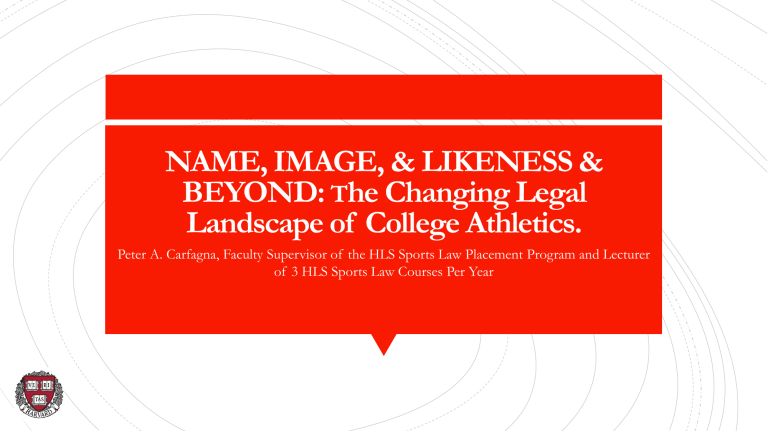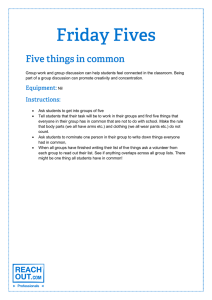The Harvard Law School Association of San Diego NIL Presentation (11.01.2021)
advertisement

NAME, IMAGE, & LIKENESS & BEYOND: The Changing Legal Landscape of College Athletics. Peter A. Carfagna, Faculty Supervisor of the HLS Sports Law Placement Program and Lecturer of 3 HLS Sports Law Courses Per Year A class of former collegiate athletes led by Shawne Alston filed a lawsuit against the NCAA and its member schools claiming that the NCAA’s rules restricting compensation in exchange for the collegiate athletes’ athletic services violated antitrust laws. District Court (2019) Judge Claudia Wilken held that the NCAA and its member schools NCAA v. Alston violated Section 1 of the Sherman Antitrust Act by agreeing to limit how much each can compensate athletes for “education related expenses.” Ninth Circuit (2020) Affirmed Judge Wilken’s ruling SCOTUS (2021) Unanimous affirmation of the Ninth Circuit’s opinion Judge Kavanaugh’s concurrence Effect as precedent and the “Amateurism” defense Prior to SCOTUS’s ruling in NCAA v. Alston, individual states State Legislation and NCAA NIL Policy passed legislation that would prohibit the NCAA, conferences, and schools from enforcing rules that prevent student-athletes from earning compensation for use of NIL. The earliest of effective date of these laws was July 1, 2021. In order to prevent an imbalance between schools based on their state’s NIL status, on June 30, 2021, the NCAA adopted a uniform interim policy suspending its current name, image, and likeness rules. “Individuals can engage in NIL activities that are consistent with the law of the state where the school is located. Colleges and universities may be a resource for state law questions. College athletes who attend a school in a state without an NIL law NCAA NIL Policy can engage in this type of activity without violating NCAA rules related to name, image and likeness. Individuals can use a professional services provider for NIL activities. Student-athletes should report NIL activities consistent with state law or school and conference requirements to their school.” Main concerns: preventing improper recruiting and pay-for-play transactions. Governed by: State law (currently, 28 states have passed Current NIL Ecosystem NIL legislation); Individual school policies; and Conference policies Sample NIL Policies Ivy League Harvard Boston College Haley and Hanna Cavinder, members of the Fresno State women’s basketball team, made an impact by signing multiple national deals on July 1, 2021. MMA Gym in Miami offered all 90 scholarship players at the University of Miami $500 to promote the gyms through social media, personal appearances, etc. Notable NIL Deals Mikey Williams, a high school basketball player, signed a representation agreement with Excel Sports to represent him for NIL deals. The entire SDSU Football Team signed NIL deals with College Hunks Hauling Junk Moving Company. BYU executed a a multi-year NIL agreement with Built Brands that will include compensation to all 123 members of the Cougars' football team as well as full tuition for walk-on players. Hercy Miller, freshman basketball player at Tennessee State University, signed a four year, $2 million endorsement deal with tech company Web Apps America. Quinn Ewers, a Texas high school quarterback, decided to forego Notable NIL Deals his senior season and enroll at Ohio State University because Texas law prohibited high school athletes from monetizing their NIL rights. Ewers has already secured over $1 million from NIL deals. FAU quarterback N'Kosi Perry signed an NIL deal with Islamorada Beer Company – the first NIL deal in the alcohol category. Clemson QB DJ Uiagalelei, University of Miami QB D'Eriq King, and Oklahoma QB Spencer Rattler all signed multiple NIL deals and are either injured or having underwhelming seasons. NAME, IMAGE, & LIKENESS & BEYOND: The Changing Legal Landscape of College Athletics. Peter A. Carfagna, Peter A. Carfagna, Faculty Supervisor of the HLS Sports Law Placement Program and Lecturer of 3 HLS Sports Law Courses Per Year
